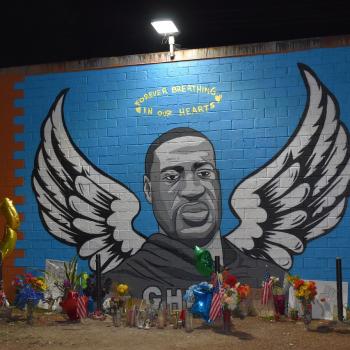A couple of days ago, I left the house to take the dog for a walk. My older son stayed home, a pile of homework at his sixth-grade side all his to do. My husband was at work, my younger son at aftercare.
When Rufus (the beloved dog) and I got home, the front door was locked. This, of course, was not all that unusual, nor was it the biggest problem known to humankind: even though I’d not brought my keys with me, my boy had locked the door after me. He who was inside the house could foreseeably let me in.
I knocked on the door. I rang the doorbell. I looked at the dog, panting at my knees, begging for water.
“Canon,” I called through the door. “Let me in!” I’d like to think that I added a pretty “please” onto this sentence, but one cannot be sure. And then, the pattering sound of footsteps on the other side of the door.

He waved at me and smiled, this much I could see through the looking glass. I waved back.
“What’s the password?” He finally said. I looked at him, Mom Eyes boring into him.
“Open the door?” I replied. “That’s the password.” He shook his head.
“Try again. What’s the password?”
“I love you.” He shook his head.
“I love you more.” He shook his head again.
“My kid is the greatest.” “Canon is cool.” “I love you, man.” He shook his head.
“I love Fortnight.” “Nintendo is the best thing ever.” “Skippadee doo da day.” He shook his head.
“I GIVE UP,” I finally said.
“Pssst. What’s the password,” he whispered. “That’s the password.” And he unlocked the door.
Let’s the record stand: If you ever have to figure out a secret password, whispering Psst. What’s the password might just get you out of any tricky situation.
But I open with this anecdote, because as I sat with the gospel reading this last week, a who’s in, who’s out kind of situation kept coming to mind. In a way, the scene that happens between Jesus and the disciples is one of gatekeeping – of a spiritual kind of gatekeeping where in some are in and some are out. And that, I think, is part of the invitation we get to chew on and mull over and let ruminate in our hearts and minds this week.
In Mark 9, Jesus and the disciples have been hanging out a lot, doing the things you might imagine the crew of twelve doing: healing people, talking about the pending death and resurrection, arguing over who’s the greatest of them all, and witnessing one dazzling white of a spectacle between Jesus, Moses, and Elijah on top of a mountain.
One might even think that the disciples are finally starting to get it, finally starting to understand the holy godman himself.
When John comes up to him and says, “Teacher, we saw someone casting out demons in your name, and we tried to stop him because he was not following us,” it’s not hard to imagine John running over from the previous encounter, perhaps even slightly out of breath. He’s reporting, tattling even but his intentions are good: he’s known and he’s seen, up close and personal, what Jesus can do, and he’s not going to let anything or anyone get in his way.
But Jesus gives a response that I imagine is the opposite of what John thought was going to happen, of what he thought Jesus was going to say.
“Do not stop him,” Jesus replies,” for no one who does a deed of power in my name will be able to soon afterward to speak evil of me. Whoever is not against us is for us.” He begins to expound upon millstones around the neck and cut-off hands and even, then, an unquenchable fire. The list goes on, eventually ending with a soliloquy about salt, but it’s these first couple of sentences I want us to focus on today, because these first couple of sentences have everything to do with spiritual gatekeeping.
But first, why all this gatekeeping talk? What does this even have to do with us, the good people of St. Paul’s Oakland? As one writer asks in a series of questions, “Why do we human beings find such satisfaction in fancying ourselves God’s bouncers? What is it about us, that we feel accomplished, successful, and even “spiritual” when we secure someone else’s failure? Why do we Christians place so many stumbling blocks in the paths of those who seek God in ways we don’t immediately recognize? Why are we so much better at noticing and judging differences than we are at seeing and celebrating commonalities?”
When I first read all those questions, I shook my head. That’s not me. That’s not us. But then I wondered if it is sometimes us – when we deem our progressive beliefs better than those of our more conservative brothers and sisters. When we shoot annoyed glances at a loud little one that interrupts our worship during the church service. When we run to those we know when it’s time to pass the peace instead of striking up a conversation with a first-time visitor.
Maybe it’s just me, or maybe some of us, all of us, are gatekeepers sometimes.
Because then, I think back to the Great Teacher’s response: It’s like “he is far too focused on what really matters – the culmination of his ministry on the cross—to waste time on gatekeeping” (here). If we were to reread the whole passage, I don’t doubt we would begin to feel the Jesus-engine revving up – just as we feel it, week by week in the lectionary calendar when we’re found reflecting on the cross, smack dab in the middle of Ordinary Time.
It’s like Jesus is standing there, going, “PAY ATTENTION TO WHAT’S IMPORTANT, PEOPLE!” (here) for this thing that’s most important is him. This thing that’s most important is the way he turned the world upside down through his life, death, and resurrection. The thing that’s most important is that he ushered in a radical way of being in this world, marked by openness, inclusivity, and hospitality.

So when Jesus says, in this passage, “Whoever is not against us is for us,” think about what that for is for: “Whoever doesn’t oppose the beautiful and salvific works of God – mercy, love kindness, justice, liberation, peacemaking, healing, nurturing,” Debie Thomas writes, “is on Jesus’ side, and our work is to welcome them, host them, include them, and love them.”
That’s it. That’s the invitation – for his is an invitation to be generous and welcoming hosts to whoever walks through these doors. To throw aside whatever locks and keys we gatekeepers sometimes hold and throw wide the gates, believing that “there’s enough divine goodness, mercy, and justice to go around” (here) for all of us misfits.
And the additional good news? No password exists for us to make this happen. One need not whisper Psst. What’s the password? To enter in, for the gates and the doors, the table and the steps have already been flung wide.
Our job is simply to welcome in. And this, I believe, we can do.
—
This sermon was offered to the good people of St. Paul’s Episcopal Church in Oakland, California on September 29, 2024. If you liked these words, you might like “Do you crave wholeness and truth? You’re human!” Otherwise, fling wide those gates and welcome in!













